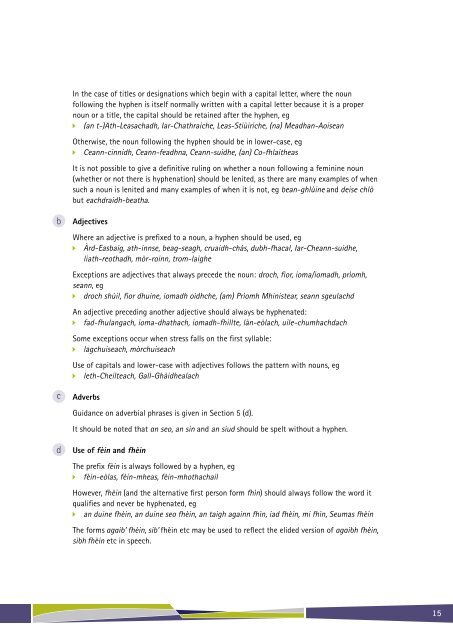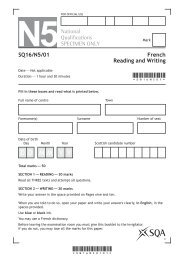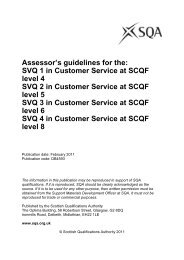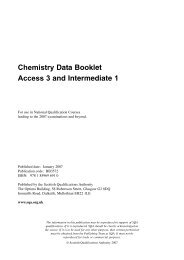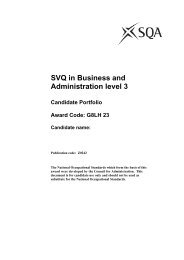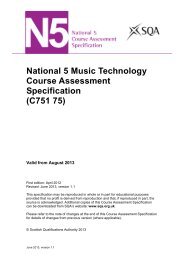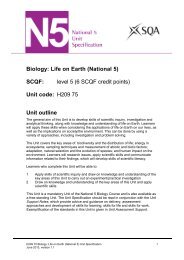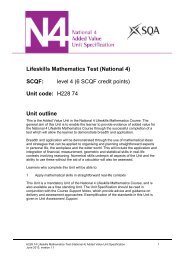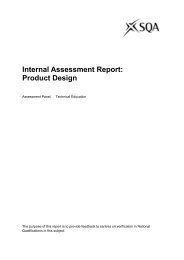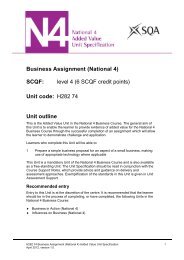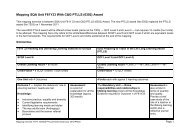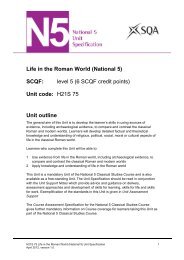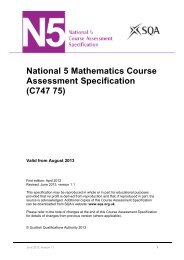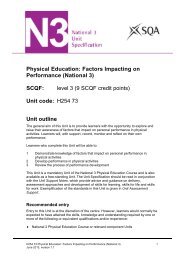Gaelic Orthographic Conventions - Scottish Qualifications Authority
Gaelic Orthographic Conventions - Scottish Qualifications Authority
Gaelic Orthographic Conventions - Scottish Qualifications Authority
You also want an ePaper? Increase the reach of your titles
YUMPU automatically turns print PDFs into web optimized ePapers that Google loves.
c<br />
d<br />
In the case of titles or designations which begin with a capital letter, where the noun<br />
following the hyphen is itself normally written with a capital letter because it is a proper<br />
noun or a title, the capital should be retained after the hyphen, eg<br />
(an t-)Ath-Leasachadh, Iar-Chathraiche, Leas-Stiùiriche, (na) Meadhan-Aoisean<br />
Otherwise, the noun following the hyphen should be in lower-case, eg<br />
Ceann-cinnidh, Ceann-feadhna, Ceann-suidhe, (an) Co-fhlaitheas<br />
It is not possible to give a definitive ruling on whether a noun following a feminine noun<br />
(whether or not there is hyphenation) should be lenited, as there are many examples of when<br />
such a noun is lenited and many examples of when it is not, eg bean-ghlùine and deise chlò<br />
but eachdraidh-beatha.<br />
Adjectives<br />
Where an adjective is prefixed to a noun, a hyphen should be used, eg<br />
Àrd-Easbaig, ath-innse, beag-seagh, cruaidh-chàs, dubh-fhacal, Iar-Cheann-suidhe,<br />
liath-reothadh, mòr-roinn, trom-laighe<br />
Exceptions are adjectives that always precede the noun: droch, fìor, ioma/iomadh, prìomh,<br />
seann, eg<br />
droch shùil, fìor dhuine, iomadh oidhche, (am) Prìomh Mhinistear, seann sgeulachd<br />
An adjective preceding another adjective should always be hyphenated:<br />
fad-fhulangach, ioma-dhathach, iomadh-fhillte, làn-eòlach, uile-chumhachdach<br />
Some exceptions occur when stress falls on the first syllable:<br />
lagchuiseach, mòrchuiseach<br />
Use of capitals and lower-case with adjectives follows the pattern with nouns, eg<br />
leth-Cheilteach, Gall-Ghàidhealach<br />
Adverbs<br />
Guidance on adverbial phrases is given in Section 5 (d).<br />
It should be noted that an seo, an sin and an siud should be spelt without a hyphen.<br />
Use of fèin and fhèin<br />
The prefix fèin is always followed by a hyphen, eg<br />
fèin-eòlas, fèin-mheas, fèin-mhothachail<br />
However, fhèin (and the alternative first person form fhìn) should always follow the word it<br />
qualifies and never be hyphenated, eg<br />
an duine fhèin, an duine seo fhèin, an taigh againn fhìn, iad fhèin, mi fhìn, Seumas fhèin<br />
The forms agaib’ fhèin, sib’ fhèin etc may be used to reflect the elided version of agaibh fhèin,<br />
sibh fhèin etc in speech.<br />
15


